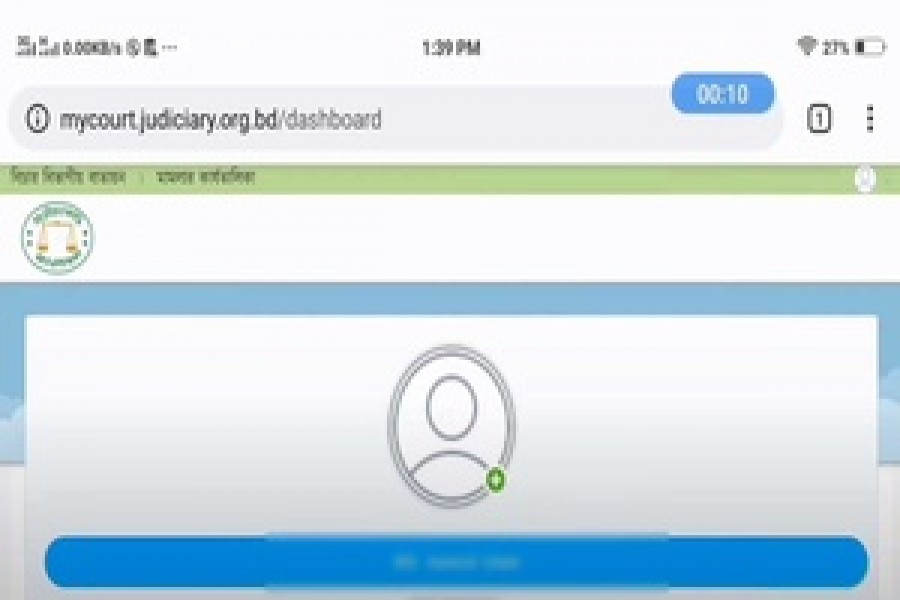Siyam Hoque
Published:2020-05-17 22:46:06 BdST
Virtual courts get off to a rocky start
NEWS DESK
When a lawyer logged in to an online court hearing with his smartphone, his initial reaction was one of confusion, which soon turned into embarrassment, FT reports.
‘Hello learned Samsung,’ the judge called out to him. He then realised that he had forgotten to type his name into the video link.
In another instance, a lawyer was nowhere to be found at the end of a virtual bail petition hearing as he had logged in using someone else's smartphone and left afterwards.
While the advent of e-justice is widely being viewed as a necessary step to keep the justice system flowing during the lockdown over the coronavirus outbreak, the nascent stages of the process have been far from smooth for judges and lawyers alike.
The problems range from disruptions to proceedings due to slow internet speeds to the submission of scanned handwritten documents, which are mostly rendered illegible.
That registration officers of the court still have to physically deliver all the relevant case bundles to the judges also suggests the innovation is yet to reap the desired results.
Both the High Court and lower courts in Dhaka are dealing with similar issues.
Unaccustomed to working remotely, lawyers too have found themselves in a quandary after the e-justice system, mandated by a new ordinance, kicked off in line with the practice directions issued by Chief Justice Syed Mahmud Hossain on Sunday.
Currently, lower courts are only conducting bail hearings via videoconferencing. But the reactions to the procedure from lawyers have been mixed at best, with calls for a boycott of the system in many districts due to a lack of training.
To take part in an online hearing, a lawyer must register on a specific website using his phone number and an email id.
The lawyer will then get an SMS immediately and using that information a password must be created within 24 hours.
After that, he can log in to the website and take part in online court proceedings as well as file bail petitions and all other documents related to the case.
A computer or a smartphone or even a video chatting app can be used to attend an online hearing.
How lawyers and judges view e-justice
Many lawyers have lauded the initiative to move the court proceedings online as it has enabled them to maintain their livelihoods during the nationwide shutdown. Judges meanwhile have lamented the shortcomings of the process.
Most of the petitions submitted online do not carry the correct information attached to them, causing trouble for the court, according to a judge at the Dhaka Chief Metropolitan Magistrate Court.
“The process has not started in full swing. Some of the lawyers are not capable of utilising the relevant software. This has been a hindrance in bail petition hearings,” Md Zafar Hossain, deputy commissioner of the police's Crime, Information and Prosecution Department, told the news agency.
“We don’t have computers with internal webcams while it is hard to work on personal smartphones. We can’t upload the preparatory documents for a hearing, or parts of the directives from the judges as we don’t receive a link to bail petition immediately after it is filed,” he said.
Although police personnel have received primary training on the use of the technology, it is still not enough for them to be able to follow the online process properly, according to Zafar.
Apart from the state counsels, lawyers are not trained on the online proceedings, HM Masum, office secretary of Dhaka Ainjibi Samity's executive committee, told the news agency.
“The authorities should have started with a pilot project in a district court or a metropolitan area. Starting the online court proceedings directly in all districts and metropolitan areas was not a good idea,” he said.
Many lawyers have complained about not getting any notification after filing a petition, said Masum, adding that the incorporation of an ‘auto-reply’ system could be helpful in this regard.
Leaders of the lawyers’ association also shared their grievances about the system with the Dhaka metropolitan sessions judge on Thursday, according to him.
Lawyer Sirajul Islam believes that the main courts could convene twice a week to hear some of the most important cases instead of conducting all hearings online to mitigate some of the problems.
Other lawyers point out that judges, lawyers and clerks are coming to the court premises as it is and therefore, there shouldn't be any issue in conducting traditional hearings.
On the other hand, Ali Khan Hassan, general secretary of Dhaka Ainjibi Samity, said he did not have any issues obtaining bail orders in a few cases. He believes lawyers will gradually come to terms with the process of remote court proceedings.
However, he said he is yet to take part in an online hearing.
“India initiated the e-justice system back in 2003 and yet they still haven't completed the implementation process. We, on the other hand, have just launched it. All the problems will be ironed out over time,” said a senior judge at a Dhaka court.
Unauthorized use or reproduction of The Finance Today content for commercial purposes is strictly prohibited.


